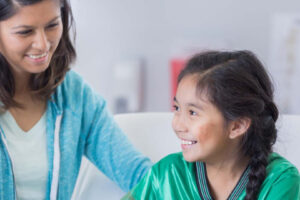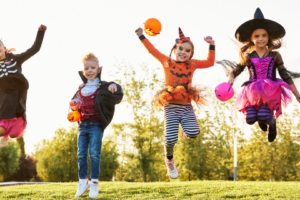Empty shelves in the grocery stores. Schools closed. Social distancing. The global coronavirus outbreak has hit home, leaving parents in uncharted territory. These factors can raise the overall level of anxiety for both children and adults.
Here are some tips for parents to help address their child’s questions and concerns about the coronavirus, and how we can all get through these uncertain times together.
Be Calm and Straightforward
Children as young as 2 or 3 years old look to adults as models for how to behave and manage emotions. They learn and absorb what they see, and they are extremely keen observers.
That is why it is so important to maintain a sense of calm while practicing the necessary precautions for your family’s health. For children across all stages of development, sticking with simple key points about the virus is likely the best way for them to be well-informed without being overloaded or scared.
Additionally, be honest and straightforward about the information that you are providing them and ensure that it is from a credible source. Children have a way of finding out the truth regardless of what you tell them.
Acknowledge the Disruption of Routine and Social Distancing
Your child’s daily routine has been disrupted, and it may continue to be so for an unknown amount of time. Not having a routine can disturb a child’s sense of order and bring about feelings of anxiety. As time passes, children will be more attuned to the fact that life has changed – and they will want to know why.
It is important to share with your child that one of the main strategies to curb the spread of the virus is extensive social distancing, which you can explain as avoiding in-person meetings large and small. You can tell your child that doing so is critical to help prevent people from getting sick. This includes social events with friends like playdates and sleepovers, and large gatherings at church, school, sporting events, restaurants and movie theaters.
Practice What You Preach
If children see you engaging in healthy, disease-prevention practices, they are more likely to follow your lead. Teach by example; maintain safe practices and healthy habits. In addition to practicing social distancing, encourage handwashing and wiping down frequently-used hard surfaces with 70% alcohol-based cleansers. Handwashing should be done for 20 seconds each time, which is roughly the amount of time it takes to sing “Happy Birthday” twice.
Find Support in Healthy Habits
You can help minimize your child’s anxiety about the potential future implications of the virus and its impact on day-to-day life. You can explain to your child that whatever they are experiencing or feeling about this virus, others are dealing with these feelings, too. In other words, your child is not alone, and we are all in this together.
Focus on the here-and-now. Encourage your child to concentrate on important personal wellness practices. Enjoying hobbies such as art, music, and other creative practices can help manage mental health and wellness. Exercising, healthy eating and maintaining important relationships with family are also habits to devote time and energy to during this hiatus.
Ankur Desai, MD, is a board certified child/adolescent psychiatrist. He can be reached by calling 732-637-6323.





